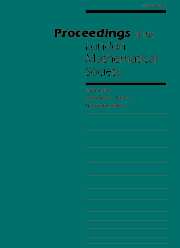Article contents
On finite and infinite Ck-[Ascr ]-determinacy
Published online by Cambridge University Press: 01 September 1997
Abstract
Let $f:({\mathbb R}^n,0)\rightarrow(\Bbb R^p,0)$ be a $C^\infty$ map-germ. We define $f$ to be finitely, or $\infty$-, $\mathcal A$-determined, if there exists an integer $m$ such that all germs $g$ with $j^mg(0)=j^mf(0)$, or if all germs $g$ with the same infinite Taylor series as $f$, respectively, are $\mathcal A$-equivalent to $f$. For any integer $k$, $0\le k<\infty$, we can consider $\mathcal A$\rq s $C^k$ counterpart (consisting of $C^k$ diffeomorphisms) $\mathcal A^{(k)}$, and we can define the notion of finite, or $\infty$-,$\mathcal A^{(k)}$-determinacy in a similar manner. Consider the following conditions for a $C^{\infty}$ germ $f$: (a$_k$) $f$ is $\infty$-$\mathcal A^{(k)}$-determined, (b$_k$) $f$ is finitely $\mathcal A^{(k)}$-determined, (t) $m_n^{\infty}\theta(f)\subset tf(m_n\theta(n))+\omega f(m_p\theta(p))$, (g) there exists a representative $ f:U\rightarrow\Bbb R^p$ defined on some neighbourhood $U$ of 0 in $\Bbb R^n$ such that the multigerm of $f$ is stable at every finite set $S\subset U-\lbrace0\rbrace$, and (g$^\prime$) every $f^\prime $ with $j^\infty f^\prime(0)=j^\infty f(0)$ satisfies condition (g). We also define a technical condition which will imply condition $(\mbox{g})$ above. This condition is a collection of $p+1$ \Lojasiewicz inequalities which express that the multigerm of $f$ is stable at any finite set of points outside 0 and only becomes unstable at a finite rate when we approach 0. We will denote this condition by (e). With this notation we prove the following. For any $ C^\infty$ map germ $f:(\Bbb R^n,0)\rightarrow(\Bbb R^p,0)$ the conditions (e), (t), (g$'$) and ($\mbox{a}_{\infty}$) are equivalent conditions. Moreover, each of these conditions is equivalent to any of ($\mbox{a}_k$) $(p+1\le k<\infty)$, ($\mbox{b}_k$) $(p+1\le k<\infty)$.
1991 Mathematics Subject Classification: 58C27.
- Type
- Research Article
- Information
- Proceedings of the London Mathematical Society , Volume 75 , Issue 2 , September 1997 , pp. 369 - 435
- Copyright
- London Mathematical Society 1997
- 1
- Cited by


